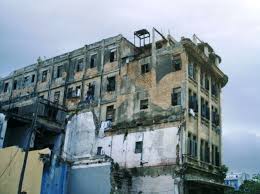deteriorate
英 [dɪˈtɪə.ri.ə.reɪt]
美 [dɪˈtɪr.i.ə.reɪt]
- vi. 恶化,变坏
- vt. 恶化
使用频率:

记忆方法
1. in, in- => interior.
2. ex, ex- => exterior.
3. de, de- => *deterior => deteriorate.
2. ex, ex- => exterior.
3. de, de- => *deterior => deteriorate.
中文词源
deteriorate 恶化
de-, 向下。-ter, 比较级后缀,见interior. 即使更下,恶化。
英语词源
- deteriorate
-
deteriorate: [16] The meaning of deteriorate resides etymologically in its first syllable, which represents the Latin preposition dē ‘down’. To this was added the adjectival suffix -ter, to produce *dēter ‘bad’, and this in turn was modified with the comparative suffix -ior to dēterior ‘worse’. Dēterior formed the basis of the verb dēteriorāre ‘get worse’, source of English deteriorate.
- deteriorate (v.)
- 1640s (as a past participle adjective, 1570s), from Late Latin deterioratus, past participle of deteriorare "get worse, make worse," from Latin deterior "worse, lower, inferior, meaner," contrastive of *deter "bad, lower," from PIE *de-tero-, from demonstrative stem *de- (see de). Originally transitive in English; intransitive sense is from 1758. Related: Deteriorated; deteriorating.
权威例句
- 1. The position of the have-nots in our society could deteriorate even further.
- 穷人的社会地位可能会进一步恶化。
- 2. Food is apt to deteriorate in summer.
- 食物在夏天爱变质.
- 3. Police, weary and increasingly sour in mood, wonder aloud why the situation has been allowed to deteriorate.
- 警察们疲惫不堪,心情也越来越糟糕,他们不禁满腹狐疑地问:为什么听凭情况不断地恶化下去?
- 4. There are fears that the situation might deteriorate into full-scale war.
- 人们担心形势可能恶化而演变成一场全面战争。
- 5. This food will deteriorate rapidly on contact with air.
- 这种食物一接触到空气即迅速变坏.
